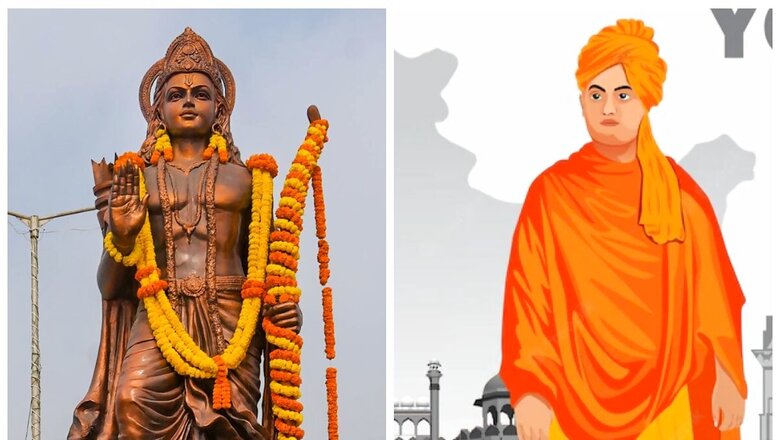
views
The 10 greatest souls in India are historical and spiritual individual souls who have had a profound impact on Bharat’s culture and philosophy. Their impact on the world’s philosophy, tradition and culture is profound, immense and indelible.
- Lord Rama
Lord Rama, hailed as an avatar of Lord Vishnu, holds a central place in the Sanatani-Hindu tradition of Bharat. He is revered for his unwavering commitment to dharma and is known as Maryada Purushottam and Adrash Purush. Rama’s character epitomises righteous conduct, setting universal and timeless moral standards. His reign, referred to as Ram Rajya, symbolises an ideal society, state, government, and citizenry. Rama’s name is synonymous with truth, making him the epitome of truthfulness. He willingly sacrifices personal comforts and desires for the greater good, demonstrating selflessness and a readiness to make sacrifices for the welfare of others. Rama leads by example, emphasising the importance of high moral standards, humility, and compassion in leadership and interactions with others.
- Lord Krishna
Another avatar of Lord Vishnu, Krishna’s life and teachings are documented in the Mahabharata and the Bhagavad Gita. He is a beloved deity and philosopher. Following your destined duty without seeking the reward of your work is his core creed which has enchanted the world, particularly the modern world, where the only way to seek success is through reward. The philosophy of a human being existing as a witnessing self is his contribution to the world of ideas and culture.
- Mahavira
Mahavira, the 24th Tirthankara of Jainism, is renowned for his teachings on non-violence, truth, and self-discipline. His philosophy centres around several fundamental principles. At its core is ahimsa, or non-violence, wherein Mahavira preached absolute non-violence towards all living beings, underlining the sanctity of every soul and the impediment to spiritual progress caused by harming any form of life. Aparigraha, or non-possessiveness, advocates minimising material possessions and attachments, believing that attachment to wealth inhibits spiritual growth. This philosophy has influenced the concept of minimalism in Western thought. Mahavira also stressed the importance of truthfulness in one’s life.
- Gautam Buddha
Gautam Buddha, the founder of Buddhism, is renowned for his enlightenment and teachings on the Four Noble Truths and the Eightfold Path. Central to Buddhism is the practice of meditation, which aims to cultivate mindfulness and concentration to gain insight into reality and attain enlightenment, known as nirvana. Buddha’s advocacy of the Middle Way, a balanced approach to life avoiding extremes, underscores the importance of moderation and mindfulness. Nirvana, the ultimate goal, symbolises liberation from suffering, rebirth, and attachments, representing perfect peace and spiritual enlightenment.
- Adi Shankaracharya
A philosopher, theologian, and revivalist, Adi Shankaracharya played a significant role in the revival of Advaita Vedanta and the consolidation of non-dualism doctrine. He revitalised various sects and traditions within Hinduism, promoting Advaita Vedanta as a unifying philosophical system. Shankaracharya’s teachings emphasised the non-dual nature of reality and the oneness of the individual soul (Atman) with the ultimate reality (Brahman). His extensive travels and discourses contributed to a deeper understanding of spirituality in Indian society. He established monastic centres (mathas) across India, serving as hubs for preserving and disseminating Vedic knowledge and spiritual wisdom.Top of Form
Top of Form
Guru Nanak
The founder of Sikhism, Guru Nanak emphasised the importance of one god, equality, and social justice. His teachings are enshrined in the Guru Granth Sahib. Guru Nanak emphasised the belief in one, formless, and omnipresent God (Ik Onkar), transcending religious boundaries. He preached the equality of all individuals, regardless of their caste, creed, or social status, promoting a society based on unity and brotherhood. Guru Nanak advocated selfless service (seva) and living an honest, righteous life as a means to connect with god. He criticised empty rituals and emphasised inner spirituality and devotion to god as the true path to salvation.
Chaitanya Mahaprabhu
A 16th-century saint and proponent of the Bhakti movement, Chaitanya Mahaprabhu is known for his devotion to Lord Krishna and the spread of the ‘Hare Krishna’ mantra. He emphasised devotion (bhakti) as the path to connect with the divine and attain spiritual realisation. Chaitanya popularised the practice of chanting the ‘Hare Krishna’ mantra as a means to purify the mind and soul. He encouraged complete surrender to the will of god and believed that genuine devotion arises from the heart. Chaitanya advocated universal love and saw the presence of the divine in every living being, promoting compassion and equality. His teachings often involved experiencing divine ecstasy through devotion and chanting, leading to a deep spiritual connection with Krishna.
Kabir
Monotheism: He emphasised the worship of one formless, timeless, and omnipresent god, rejecting idol worship and religious divisions. 2. Inner spirituality: Kabir taught that god resides within every individual, and one can experience the divine through inner spirituality rather than rituals. 3. Universal brotherhood: He promoted unity among all people, transcending caste and religious boundaries, and advocating for equality and love for all. 4. Simple living: Kabir emphasised a life of simplicity and renunciation of worldly desires as a path to spiritual growth. 5. Detachment and devotion: He encouraged detachment from material possessions and devotion to god as the means to attain salvation and eternal bliss.
Guru Gorakhnath
A revered saint and yogi, Gorakhnath is associated with the Nath tradition of yoga and mysticism. His teachings focus on the path of self-realisation. He emphasised the practice of yoga and meditation to attain spiritual enlightenment and union with the divine. Gorakhnath taught the importance of mastering one’s own mind and desires to achieve self-realisation. He encouraged detachment from material possessions and worldly attachments as a means to free the soul from suffering. Gorakhnath advocated selfless service to humanity and helping those in need as an expression of devotion.
Swami Vivekananda
A key figure in the introduction of Indian philosophies of Vedanta and yoga to the Western world, Vivekananda’s speeches at the World’s Parliament of Religions in Chicago in 1893 brought recognition to Hinduism and yoga. He promoted the philosophy of Vedanta, emphasising the divinity within every individual and the universality of all religions. Vivekananda stressed self-realisation as the ultimate goal of life, encouraging individuals to realise their inner potential and oneness with the divine. He advocated selfless service to society as a means to worship and serve the divine, emphasising the importance of helping the less fortunate. Vivekananda inspired people to cultivate fearlessness, self-confidence, and a strong sense of purpose in life. He worked towards fostering harmony among different religions and believed that all paths ultimately lead to the same truth, promoting religious tolerance and understanding.
These individuals have left an enduring legacy in India and continue to influence spiritual, philosophical, and cultural thought both in India and around the world. Their teachings and contributions have played a significant role in shaping the rich tapestry of Indian heritage and spirituality.
Geetanjali Mehra MA, BEd is an environmentalist who has created more than 450 vrikshayurveda forests in the country. She writes on Indian civilization and Sanatana Tradition. Views expressed in the above piece are personal and solely that of the author. They do not necessarily reflect News18’s views.



















Comments
0 comment